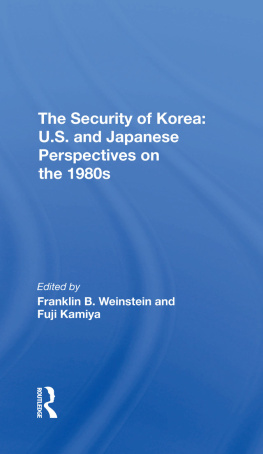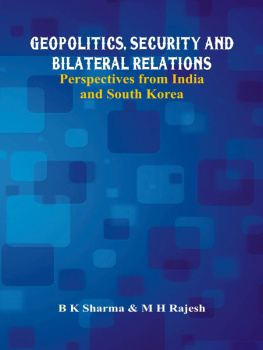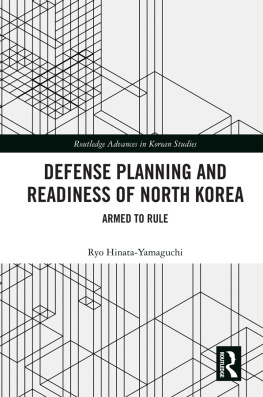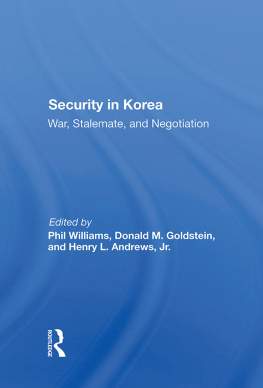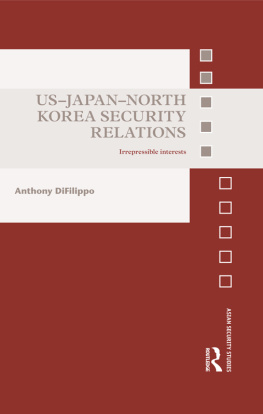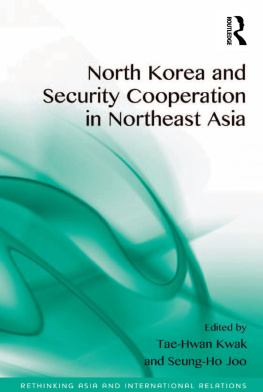The Security of Korea
Other Titles in This Series
Nuclear Energy and Nuclear Proliferation: Japanese and American Views, Ryukichi Imai and Henry S. Rowen
U.S.-Japan Relations and the Security of East Asia: The Next Decade, edited by Franklin B. Weinstein
Presidential Decisionmaking in Foreign Policy: The Effective Use of Information and Advice, Alexander L. George
Communist Indochina and U.S. Foreign Policy: Postwar Realities, Joseph J. Zasloff and MacAlister Brown
The Indian Ocean in World Politics, Larry W. Bowman and Ian Clark
The Soviet Union in the Third World: Success and Failure, edited by Robert H. Donaldson
Congress and Arms Control, edited by Alan Platt and Lawrence D. Weiler
Arms Transfers to the Third World: The Military Buildup in Less Industrial Countries, edited by Uri Ra'anan, Robert L. Pfaltzgraff, Jr., and Geoffrey Kemp
Crisis Resolution: Presidential Decision Making in the Mayaguez and Korean Confrontations, Richard G. Head, Frisco W. Short, and Robert C. McFarlane
Presidents, Secretaries of State, and Crises in U.S. Foreign Relations: A Model and Predictive Analysis, Lawrence S. Falkowski
U.S. Policy in International Institutions: Defining Reasonable Options in an Unreasonable World, edited by Seymour Maxwell Finger and Joseph R. Harbert
Westview Special Studies in International Relations
The Security of Korea: U.S. and Japanese Perspectives on the 1980s
edited by Franklin B. Weinstein and Fuji Kamiya
Any discussion of the security of Korea has implications for U.S.-Japan relations, but the Carter administration's announcement in 1977 of its intention to withdraw U.S. ground-combat forces from Korea by 1982, which brought to the surface deep-rooted Japanese and American frustrations with one another, made it clear that neither side fully understood the other's view of Korea.
This book, a collaborative effort by specialists of diverse expertise and viewpoints, clarifies U.S. and Japanese perceptions of the Korean problem and explores alternative approaches to the maintenance of peace and security on the Korean peninsula. Demonstrating that much of the conventional wisdom about Korean security rests on oversimplifications, exaggerated fears, and mistaken assumptions, the authors assert that the prospects for avoiding conflict grow brighter despite existing pitfalls, and offer recommendations for the U.S. and Japanese governments.
Franklin . Weinstein is director of the Project on United States-Japan Relations at Stanford University, where he also teaches in the Department of Political Science. Fuji Kamiya is professor of international relations at Keio University and serves as research director of the Japan Institute of International Affairs.
Prepared under the auspices of the Project on United States-Japan Relations Stanford University
The Security of Korea: U.S. and Japanese Perspectives on the 1980s
edited by Franklin B. Weinstein and Fuji Kamiya
Coauthors:
Selig S. Harrison
Ryukichi Imai
Fuji Kamiya
Masataka Kosaka
Makoto Momoi
Daniel I. Okimoto
Henry S. Rowen
Kiichi Saeki
Franklin B. Weinstein
Allen S. Whiting
First published 1980 by Westview Press, Inc.
Published 2019 by Routledge
52 Vanderbilt Avenue, New York, NY 10017
2 Park Square, Milton Park, Abingdon, Oxon OX14 4RN
Routledge is an imprint of the Taylor & Francis Group, an informa business
Copyright 1980 Taylor & Francis
All rights reserved. No part of this book may be reprinted or reproduced or utilised in any form or by any electronic, mechanical, or other means, now known or hereafter invented, including photocopying and recording, or in any information storage or retrieval system, without permission in writing from the publishers.
Notice:
Product or corporate names may be trademarks or registered trademarks, and are used only for identification and explanation without intent to infringe.
Library of Congress Cataloging in Publication Data
Main entry under title:
The Security of Korea.
(Westview special studies in international relations)
1. United StatesRelations (military) with Korea. 2. KoreaRelations (military) with the United States. 3. United StatesForeign relationsJapan. 4. JapanForeign relationsUnited States. I. Harrison, Selig S. II. Weinstein, Franklin B. III. Kamiya, Fuji. IV. Series: Westview special studies in international relations and U.S. foreign policy.
E183.8.K7S43 355'.033'0519 80-13544
ISBN 13: 978-0-367-29572-1 (hbk)
Selig S. Harrison is senior associate at the Carnegie Endowment for International Peace. He covered North and South Korea during many years in Asia as a correspondent for the Washington Post. He is chairman of the University Seminar on Korea at Columbia University.
Ryukichi Imai is general manager, engineering, of the Japan Atomic Power Company, He is also a special assistant to the minister of foreign affairs, dealing mainly with nuclear and arms-control matters.
Fuji Kamiya is professor of international relations at Keio University and serves as a trustee of the Japanese Institute of International Affairs, the Japan Association of International Relations, the Japan Association of International Law, and the Research Institute for Peace and Security. He has been appointed to the Foreign Advisory Committee of the Korean Institute of International Studies.
Masataka Kosaka is professor of international politics at Kyoto University.
Makoto Momoi is director of international security studies and professor of international relations at the National Defense College of Japan.
Daniel I. Okimoto is assistant professor of political science at Stanford University.
Henry S. Rowen is professor of public management in the Graduate School of Business at Stanford University. He has served as president of the Rand Corporation, as assistant director of the Bureau of the Budget, and as deputy assistant secretary of defense.
Kiichi Saeki is chairman of the Nomura Research Institute. He formerly served as president of the National Defense College of Japan.
Franklin . Weinstein is director of the Project on United States-Japan Relations at Stanford University, where he also teaches in the Department of Political Science.
Allen S. Whiting is professor of political science at the University of Michigan.
Both Americans and Japanese find it hard to think about the security of Korea without coming to dwell on the implications for U.S.-Japan relations. Korea has, of course, an intrinsic importance for the United States and Japan, but their respective relations with Korea also have a major impact on the way Washington and Tokyo view each other. For many Americans, a critical part of the rationale behind the U.S. commitment to Seoul is the latter's importance to Japan. If the Japanese did not consider a U . S. commitment to South Korea vital to their security, the character of that commitment might change dramatically. From a Japanese perspective, the prospects for Korean security depend largely on what the United States is prepared to do; Japanese discussions of Korea's future tend to become debates about U.S. policy. And the Japanese inevitably view U.S. policy toward Korea as an indicator of the strength of the U.S. commitment to Japan itself.

